Expert Interviews
- University Reviews
- Career Guide
 Video Counseling
Video CounselingImportant Facts
- Ask any Question - CV Forum

Top 10 Highest Paying Jobs In Psychology [New Salary 2025]
College Vidya Team Jan 11, 2025 12.6K Reads

The popularity of psychology as a professional field is gaining momentum in the 21st century in India and across the globe as newer discoveries and insights about the psychology and workings of the human mind unfold. Psychology as a professional field is opening up many highly paid job options in the field along with opportunities to work collaboratively with professionals from other disciplines like computer science, machine learning and artificial intelligence, thus promising bright prospects in the future. The path to career establishment in psychology can follow multiple trajectories, each requiring a different area of specialization and qualifications.
If you are also a psychology aspirant seeking to develop a successful career in the field, then there are some lucrative professional domains that you can surely consider taking up. This blog brings to you the 10 most highly paid jobs of psychology as of 2025 along with important details like the educational qualifications needed to start a career in it, the key responsibilities associated as well as the average salary received in the field.
Continue reading to discover key details about the 10 highest paying jobs in the sector of psychology.
Top 10 Job Roles in Psychology
Psychology is a field in which many aspirants and students want to venture, both because of the rising awareness of its central role in human and social life and processes as well as the rising popularity of the discipline leading to greater pay and compensation. While the salary packages that can be earned in this discipline do not start at very handsome brackets in the outright start, the scope of escalating to higher lucrative packages with experience and credibility in the field are quite high.
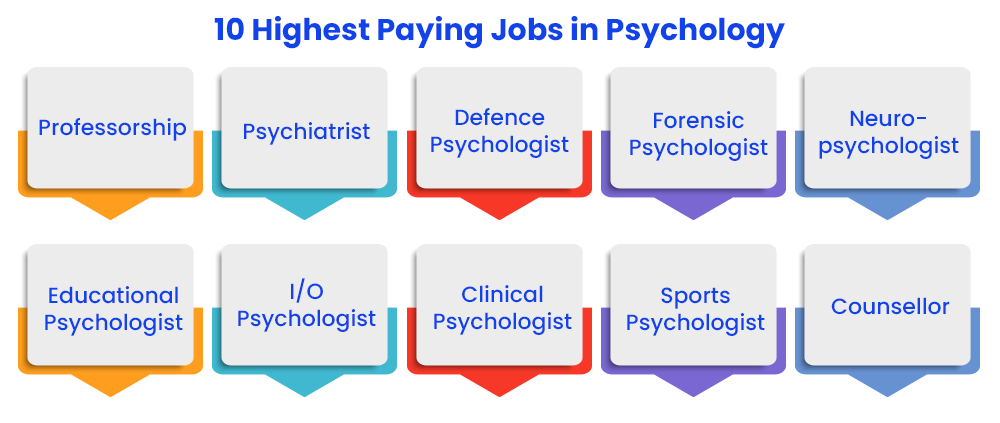
As per the latest statistics of average remuneration in the field of psychology along with the prospects of career development in the job domain, here we have curated a list of the top 10 highest paying roles that psychologists can take up in the professional world.
|
Job Role |
Average Salary |
Minimum Qualification Needed |
|
Professor of Psychology |
INR 9.94 LPA |
|
|
Psychiatrist |
INR 9.67 LPA |
|
|
Military/Defence Psychologist |
INR 6.8 LPA |
|
|
Forensic Psychologist |
INR 5.93 LPA |
|
|
Neuropsychologist |
INR 4.86 LPA |
|
|
Educational Psychologist |
INR 4.85 LPA |
|
|
Industrial/Organisational Psychologist |
INR 4.14 LPA |
|
|
Clinical Psychologist |
INR 4.08 LPA |
|
|
Sports Psychologist |
INR 5 LPA |
|
|
Counselor |
INR 3.62 LPA |
|
1. Professor of Psychology
Professorship in psychology is currently the highest paying job sector for psychologists to venture into. Psychology professorship can be taken up by professionals who have at least a Master’s degree or a doctoral degree in psychology. This job can be quite meaningful to those seeking to venture into the field of higher education and academia, and offers a vast scope of professional growth both as a researcher and a professor.
More details related to the educational requirements, average salary and required skills for this profession are provided below.
Required Educational Qualifications
- A Master’s Degree in Psychology with at least 55% Aggregate Marks
- Preferably a Doctor’s Degree in Psychology (or a closely related field)
- A Qualification Score in UGC-NET for Assistant Professorship
Average Salary
The average salary a professor of psychology can earn is around INR 9.94 LPA with a few years of experience. On a long-term basis in this career domain, one can earn lucratively high salaries ranging from INR 15-20 LPA as well.
Key Skills
The major skills needed to thrive in the career of professorship include:
- Teaching Aptitude
- Research Aptitude
- Thorough Knowledge of Psychological Concepts
- Communication Skills
- Public Speaking
- Administrative Skills
- Curricular Planning
- Course Design
- Student & People Management
Job Role and Responsibilities
- Teaching various units or topical areas of psychology
- Managing administrative tasks such as class management, record of student details in a class, arranging curricular events etc.
- Conducting research endeavours for further development of the field
- Contributing to educational policy formation and course designing.
- Evaluating student performance in examinations, presentations, quizzes etc.
Key Recruitment Domains
- Higher educational institutions like colleges, institutes, coaching and universities like University of Delhi, Dr. B. R. Ambedkar University, University of Calcutta, St. Xavier’s College etc..
- Research institutes like Indian Institute of Health Management Research, NIMHANS etc.
2. Psychiatrist
Psychiatrists are medical professionals who specialise in the field of medicine for psychopathologies and are doctors who can explore professional opportunities in private and public sector hospitals as well as medical and psychiatric research institutions. Although one of the highest paying fields in psychology, psychiatry also requires a compulsory MBBS for an aspirant to pursue the career. Thus, only those aspirants who are doctors and wish to pursue a specialisation in psychology.
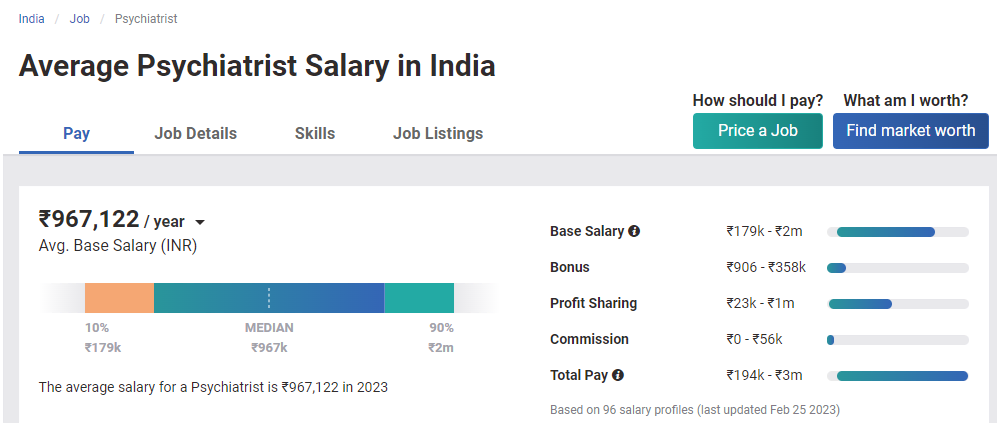
Via Payscale
More details about the field of psychiatry have been given below.
Required Educational Qualifications
- Completion of MBBS Degree from a Recognised Medical Institute/College
- An MD Program/Diploma in Psychological Medicine (DPM)/DNB Psychiatry
Average Salary
The average salary that a psychiatrist can earn is around INR 9.67 LPA with 2-3 years of professional experience. With further experience of around 4 to 5 years, a psychiatrist can earn up to INR 15 LPA quite easily.
Key Skills
The major skills and competencies that psychiatrists need to thrive in the field are:
- Thorough Knowledge of Medicine
- Thorough Knowledge of Psychiatry, Psychopathology
- Case Observation
- Applied Diagnostic Knowledge
- Active Listening
- Communication Skills
- Diagnosis And Treatment
- Prescription of Drugs
Job Role and Responsibilities
The primary job roles and responsibilities that a psychiatrist is required to fulfill include those like:
- Conducting thorough examinations of psychiatric cases and clients to assess their psychopathologies or other presenting problems.
- Administering psychological tests and other tools of assessment to facilitate the process of problem identification.
- Providing psychotherapeutic interventions and other mental healthcare services to clients.
- Prescribing drugs to psychiatric patients and clients as needed.
Key Recruitment Domains
- Psychiatrists can explore job roles in psychiatric institutions and hospitals, mental health institutions etc. in the public and private sector.
- Psychiatrists can also work in rehabilitation centres for deaddiction.
- Psychiatrists can also work in their own private practice and start a clinic for psychiatric treatment.
3. Military/Defence Psychologist
Military and defence psychologists work closely with personnels from the armed forces to aid various activities such as their recruitment and selection processes, testing for their psychological competency, providing mental health services to armed forces and assisting in rehabilitation of retired army personnels. Defence and military psychology is also a prominent field providing vast scope for research as existing theories and conceptualisations related to this specific domain are limited. Hence, military psychologists can contribute meaningfully to the academic discipline of psychology while simultaneously earning an appealing salary.
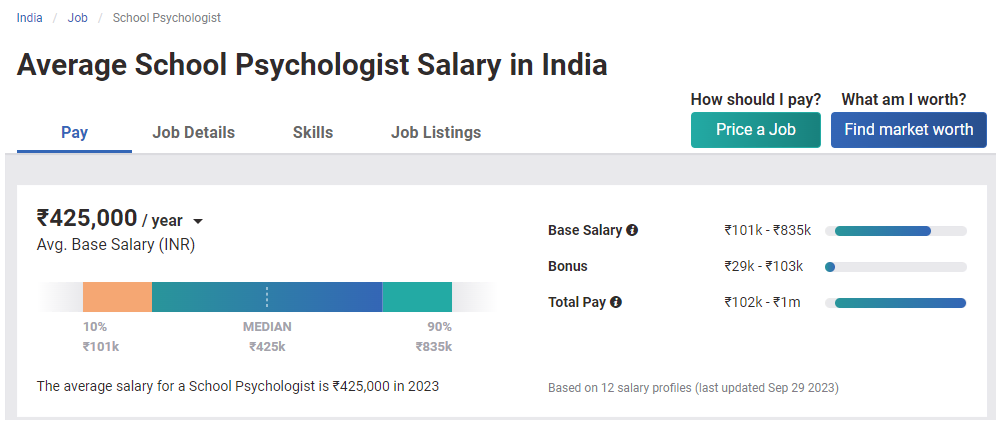
Via Payscale
Find more details about the profession of military psychology here.
Required Educational Qualifications
- A Postgraduate Degree in Psychology or preferably a Ph.D in areas related to counseling, clinical psychology or defence psychology
- A PG Diploma/Training Program in Defence/Military Psychology
- Experience with Psychological Research with Defence/Military Populations
Average Salary
Military or defence psychologists can earn approximately INR 6.8 lakhs per annum in the initial years of their career and progressively receive higher salary packages in the range of INR 9-10 lakhs per annum with a few years of professional experience.
Key Skills
The important requisite skills and competencies needed to thrive in the domain of defence psychology include:
- Case Observation and Analysis
- Data Analysis
- Research Skills
- Critical Skills
- Analytical Aptitude
- Attention to Detail
- Training and Recruitment
- Psychological Testing
- Counselling Skills
Job Role and Responsibilities
There are a number of aspects to the job role of a military psychologist, some of which include:
- Conducting systematic psychological assessment of candidates applying to armed forces through the use of observational analyses, case history study, psychological testing, interviewing etc.
- Supporting the orientation and requisite training of military personnel after recruitment.
- Regularly assessing the psychological competencies of military personnel identifying any signs of potential stress, burnout, psychopathology, antisocial tendencies in them and so on.
- Conducting regular programs and providing personalised counselling sessions to personnel requiring mental healthcare services due to stress etc.
- Assisting in rehabilitation of the personnel retiring from the workforce due to injuries.
Key Recruitment Domains
- The most major job domain for defence psychologists include the defence research bodies and psychological service units like Defence Institute of Psychological Research (DIPR), Defence Research and Development Organisation (DRDO), Defence Institute of Physiology & Allied Sciences (DIPAS), Institute for Defence Studies and Analyses (IDSA), National Defence Academy (NDA), Indian Military Academy (IMA) etc.
- They can also explore jobs in consulting firms and rehabilitation centres for the retired armed forces.
4. Forensic Psychologist
Forensic psychologists are associated with assisting police and other investigative forces get breakthroughs in criminal cases. Forensic psychologists can play a central role in crime analysis whether it is with respect to the analysis of the case, the criminal suspects, the convicts or the witnesses. With the rising importance of psychological underpinnings of criminal tendencies and behaviours, this field has grown in its scope to understand the mental competency of witnesses, convicts, suspects etc. The field is ripe with opportunities for research as well.

Via Payscale
Find more key details related to forensic and criminal psychology job roles here.
Required Educational Qualifications
- Master’s Degree in Psychology from a Recognised University/Institution
- Preferably a Doctoral Degree in Psychology in a field related to Child Psychology, Psychology of Abuse and Criminology, Psychology of Law and Ethics
Average Salary
The average salary that starters and freshers can make as forensic psychologists is nearly INR 5.93 LPA. With a few years of experience and repute in the field, one can increase their earning potential to up to INR 10 LPA as a professional.
Key Skills
The major skills and areas of expertise needed to thrive in forensic psychology include:
- Thorough Knowledge Of Psychology
- Understanding of Psychological Disorders, Psychopathologies and Mental Illnesses
- Knowledge Of Psychotherapeutic Techniques
- Communication Skills
- Critical Thinking Skills
- Analytical Aptitude
- Stress Management
- Case Observation
- Forensics
- Clinical Aptitude
Job Role and Responsibilities
The job role of a forensic psychologist is quite fascinating and unique, and some of the major roles and responsibilities they fulfill as part of their work duties include:
- Psychological testing and assessment of the cognitive functioning of convicts, suspects and victims.
- Assessment of suspects through observation to spot if any psychopathologies are present in them.
- Conducting detailed analysis of cases to spot patterns of sociopathic behaviour.
- Providing mental healthcare services and psychotherapy to convicts and suspects found mentally challenged.
- Collaborating with other mental healthcare professionals such as counselors, clinical psychologists, psychiatrists etc. to provide consultation services to investigating bodies.
- Testifying in court and in front of judicial bodies about psychopathologies or possible psychological underpinnings of criminal cases.
Key Recruitment Domains
- Forensic psychologists can work with armed forces, investigating units and police departments of various states or the nation like the Defence Forces, Indian Police Forces, Armed Forces, Central Reserve Police Force, Central Bureau of Investigation etc.
- They can also work in rehabilitation centres to handle juvenile cases.
- Further, they can also explore consultation roles providing guidance to investigating bodies and authorities about various crime cases.
5. Neuropsychologist
Neuropsychology is the field of psychology that is concerned with understanding the relationship between the brain and psychological processes and is closely associated with the discipline of neurology. Neuropsychology offers jobs related to assistance in neurological medical research (although an MBBS is not mandatory to venture into this field), research and development in cognitive psychology etc. Neuropsychologists often closely work with psychiatrists and clinical psychologists to achieve breakthroughs about potentially effective psychotherapies and treatments for psychopathology.
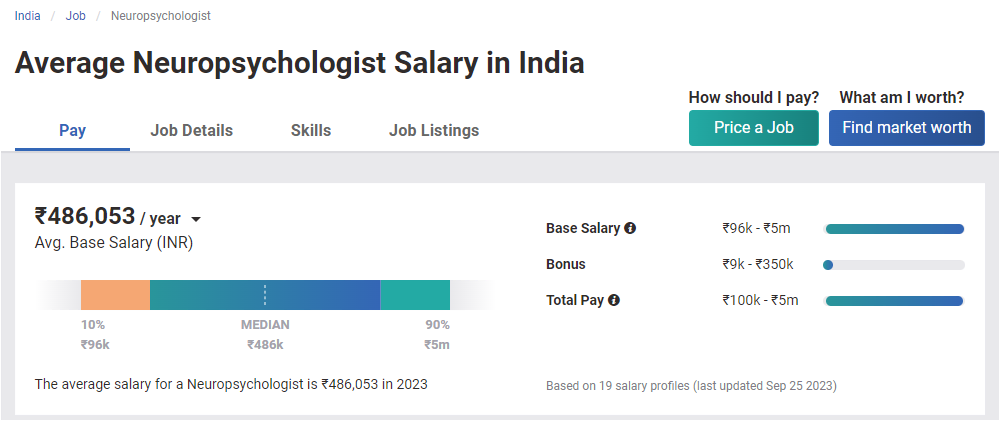
Via Payscale
More key details about the job role of a neuropsychologist have been outlined below.
Required Educational Qualifications
- Master’s Degree in Psychology/Applied Psychology with specialisation in cognitive psychology or neuropsychology
- Doctoral or M.Phil degree in Psychology
Average Salary
While the initial salary packages that neuropsychologists are likely to receive range around INR 4.86 LPA, with 4-5 years of experience, they can easily earn anywhere between INR 8-9 LPA.
Key Skills
The important skills that neuropsychologists must possess to prosper in this career domain are:
- Knowledge and skills in Medicine
- Cognitive Assessment
- Psychological Testing and Analysis
- Analytical Skills
- Critical Aptitude
- Research Skills
- Experimental Skills
- Attention to Detail
- Knowledge of Psychopathology
- Psychotherapeutic Knowledge
Job Role and Responsibilities
Some of the major roles and responsibilities associated with this profession include:
- Conducting thorough research to discover advanced knowledge about the relation of human psychological processes and behaviour with the brain and its parts.
- Conducting testing and other psychological assessments on clients and cases presenting with injuries to the brain to examine their cognitive faculties.
- Working with mental healthcare workers to diagnose the psychological disorder or cognitive disorder that a particular patient or client might be facing and further collaborating with them to suggest a course of psychotherapy.
- Facilitating educational services for students with special learning needs or cognitive impairment.
- Working in educational and research centres to teach students of neuropsychology.
Key Recruitment Domains
- Neuropsychologists can work in prestigious private and public hospitals as professionals conducting research and providing consultancy to patients and clients in collaboration with doctors. Appealing healthcare institutions they can apply to include Fortis Hospitals, Apollo Hospitals, Max Hospitals, AIIMS, Safdarjung Hospital etc.
- Neuropsychologists can also work in a purely academic and research domain to explore the nature of mind-brain relationship and contribute to the field. This includes institutions like IHBAS, NIMHANS etc.
- They can also work in higher educational institutions and medical colleges for teaching purposes.
6. Educational Psychologist
Educational psychologists work towards the application of psychology and psychological principles in the field of education at various levels. A job domain with an appealing initial salary followed by opportunities for escalation, educational psychologists can work in a range of professional subdomains ranging from educational policy-making bodies to educational research, curriculum planning, school and college counseling etc.

Via Payscale
Further details about educational psychologists and their job roles are elaborated upon herewith.
Required Educational Qualifications
- A Master’s Degree in Psychology from a Recognised University
- A PG Diploma/Course in Educational Studies
- Preferably a B.Ed
Average Salary
The initial salary that an educational psychologist can earn is nearly INR 4.85 LPA. Professional experience can help the psychologist garner higher salary packages.
Key Skills
A few of the most essential skill areas needed to thrive as an educational psychologist have been listed below.
- Teaching Aptitude
- Research Skills
- Communication Skills
- Counseling Skills
- Data Analysis
- Observational Skills
- Public Speaking
- Interpersonal Skills
- Empathy
- Psychological Assessment and Testing
Job Role and Responsibilities
The job role of an educational psychologist is concerned primarily by responsibilities like:
- Conducting research and analysing findings to better understand how psychology and education function and streamlining psychological principles and practices for better educational outcomes.
- Contributing to policy formation in the educational sectors by working closely with policy-making bodies.
- Providing consultancy services to schools and higher educational institutions to enhance their educational services and operations.
- Conduct training and sensitisation campaigns for teachers and educators to provide better teaching resources and services.
- Contributing to curricular and course designing.
- Providing counselling services to students and learners from various age groups to address their problems related to academics, vocation and career development. Also Read | What is Career Counselling
Key Recruitment Domains
- Schools, colleges and university bodies are the major job sectors for educational psychologists as they can work in both renowned private and public units.
- Further, they can work with educational boards and research bodies like the National Council of Educational Research and Training (NCERT), Central Board of Secondary Education (CBSE), Indian Certificate of Secondary Education (ICSE) etc.
7. Industrial/Organisational Psychologist
Industrial and organisational psychology is the perfect job domain for psychology professionals who are seeking to understand psychology as operating in the work setting while also wanting to earn lucrative salaries on their job. I/O psychologists are those psychology professionals who can work both in basic and applied areas of psychology, i.e. contribute to the psychological discipline while developing industry-oriented solutions for clients. I/O psychologists get diverse job opportunities in sectors like consultancy, research and development, management, strategy formulation and so on.

Via Payscale
The important details related to the job role of an I/O psychologist have been enlisted here.
Required Educational Qualifications
- A Master’s Degree in Psychology from a Recognised University, preferably in Organisational Behaviour (OB) or Industrial/Organisational Psychology specialisations
- A PG Diploma/Training Course in Industrial/Organisational Psychology
Average Salary
Industrial and organisational psychologists can make nearly INR 4.14 lakhs on an annual basis and also earn up to INR 10 lakhs with experience in the field. The field is lucratively compensated in psychology and through networking, I/O psychologists can explore appealing job options.
Key Skills
A few of the important skills needed to thrive in this career include:
- Organisational Development
- Training and Personnel Management
- Career Counseling
- Psychological Testing & Data Analysis
- Human Resource Management
- Team Management Skills
- Communication Skills
- Grievance Redressal
- Negotiation & Strategizing Skills
- Research Skills
- Case Study and Analytical Aptitude
- Leadership Development Skills
Job Role and Responsibilities
The primary job responsibilities and roles of an I/O psychologist can vary depending upon the specific domain they choose to apply to. A few of them have been mentioned here:
- Conducting research on various areas like organisational effectiveness, organisational development etc.
- Managing aspects like recruitment and selection in the workforce on the basis of needs assessment, KSAO assessment of candidates and other psychological assessment.
- Conducting training in areas like leadership, team-building etc.
- Managing aspects related to human resource management in case the professional is an HRM specialist.
- Contributing to organisational policy formation, strategy formation etc. through providing consultation guidance.
Key Recruitment Domains
- I/O psychologists can work as industrial specialists and explore job roles in the corporate sector in various industries.
- They can practise as I/O consultants and work with consulting giants like Accenture, TCS, Ernst and Young etc.
- They can also work in academic and research fields to contribute to the growth of the understanding of I/O psychology.
8. Clinical Psychologist
One of the most popularly chosen careers in psychology, clinical psychology is a mental healthcare domain that caters to the provision of mental health services to those individuals facing psychological concerns and psychopathologies. Clinical psychologists are primarily employed in sectors requiring active applied solutions in the form of therapies, although they can still work to produce research pieces and contribute to the academic field. Thus, this field is the most suitable for professionals who are seeking to work closely at the ground level, dealing with clients and patients experiencing mild to acute mental illnesses and signs of psychopathologies.

Via Payscale
Further details related to the professional field of clinical psychology have been provided below.
Required Educational Qualifications
- A Master’s Degree in Psychology from a Recognised Institution, preferably in the specialisation of Clinical Psychology
- An M.Phil degree in Clinical Psychology from an RCI-Licensed Institute
- A Licence for Practice from RCI
Average Salary
Clinical psychology is a decently paid field in India with an average annual salary of INR 4.08 LPA for professionals with nearly 2-3 years of experience. With further experience, one can earn anywhere between INR 9-10 LPA in this field.
Key Skills
Some of the essential skills that are put to use in clinical psychological settings include:
- Case Observation
- Detailed Mental Examination
- Diagnostic Skills
- Psychological Testing And Assessment
- Counseling And Therapeutic Expertise
- Empathy
- Active Listening
- Communication Skills
- Interpersonal Skills
Job Role and Responsibilities
The role of a clinical psychologist includes various responsibilities like:
- Conduct detailed examination of clients’ symptoms, signs and distress to understand the nature of their problem, their potential risk factors, triggers, nature of the presenting problem etc.
- Providing diagnosis to clients on the basis of their symptoms.
- Providing psychotherapy to the client to treat their mental disorder or condition.
- Manage the administrative and related professional aspects of clinical psychology like contracting, termination of services etc.
- Collaborating with the medical doctors of a client to understand clients’ medical underpinnings for the psychological condition.
Key Recruitment Domains
- The major professional domain that clinical psychologists can explore in hospitals and healthcare institutions like Apollo Hospitals, Fortis Mental Health Care Institution etc.
- Clinical psychologists can also work in national research centres like NIMHANS, IHBAS etc.
- They can work with social organisations and NGOs to offer their mental healthcare services to the needy, especially considering the dearth of trained MHPs in India.
9. Sports Psychologist
Sports psychology is a field gaining rising prominence in the discipline of psychology and as an independent professional domain in the world. Sports psychologists can perform a variety of job roles similar to the ones described above, but to specifically cater to the needs of those involved in sports, such as athletes, sports teams, players etc. Sport psychologists can work in areas related to counseling, psychological testing, stress management, rehabilitation etc.
More details about the job role of a sports psychologist are provided below.
Required Educational Qualifications
- A Master’s Degree in Psychology from a Recognised Institution
- A PG Course/Diploma in Sports Psychology
- Preferably a Doctoral Degree in a Field related to Sports Psychology like Athletics, Development of Psychological Principles for Sports etc.
Average Salary
The average scope of salary in the field of sports psychology is nearly INR 5 LPA as it is still a budding career domain in India. However, with professional experience and effective networking, sports psychologists can collaborate with sports institutes, counseling centres or even national sports bodies to gain highly compensated job opportunities.
Key Skills
Some of the important skills and competencies needed to thrive in the field of sports psychology include:
- Case Observation
- Research and Development
- Psychological Testing and Assessment
- Training for Athletes
- Performance Evaluation
- Stress Management
- Team-building Skills
- Team Management Skills
- Leadership Development and Training
- Counseling Skills
- Interpersonal Skills
Job Role and Responsibilities
Some of the key job responsibilities associated with the role of a sports psychologist are:
- Conducting psychological assessments and tests to examine the mental fitness and strength of athletes.
- Conducting training programs and team-building activities in sports teams to enhance goal commitment and team cohesiveness.
- Conducting training programs for leadership development among team leaders in various sports.
- Assessing the mental stress levels or potential psychopathologies in athletes and sports players.
- Providing counseling and rehabilitation services to athletes.
- Working with children and teenagers to address their developmental issues related to sports involvement if any.
Key Recruitment Domains
- Sports psychologists can work with sports organisations like Athletics Federation of India, All India Football Federation, Hockey India, Board of Control for Cricket in India etc. in the public sector unit.
- Sports psychologists can work as part of counseling centres and institutions to offer their services as well.
10. Counselor
Counselors are mental health professionals who work with clients experiencing psychological concerns on a more chronic and day-to-day basis but not suffering from any mental illness. Counselors can work in diverse settings and with diverse populations. Counselors can work as school or college counselors, organisational counselors, marriage counselors, career counselors, career counselors, rehabilitation counselors and so on. They can work with populations from various developmental groups ranging from children and teenagers to adults and geriatric populations.
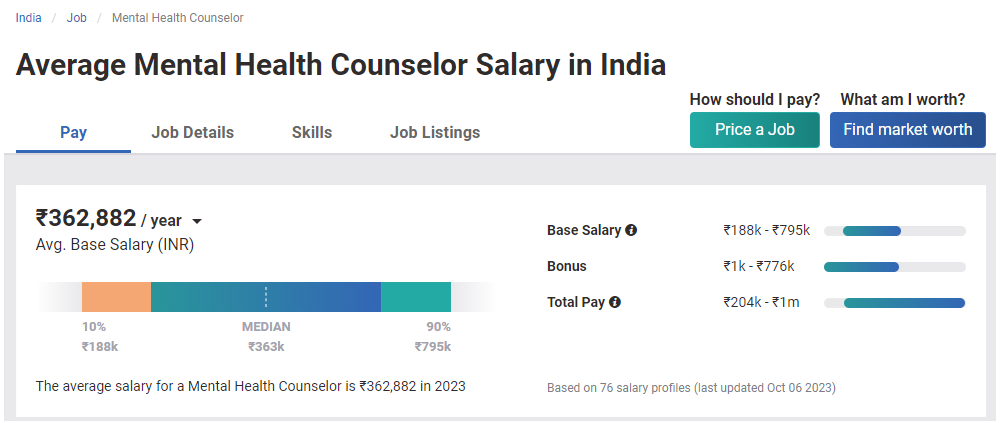
Via Payscale
Key details about counseling as a professional domain in psychology have been provided below.
Required Educational Qualifications
- A Master’s Degree in Psychology from a Recognised Institution with Preferably a Specialisation in Counseling Psychology or Clinical Psychology
- A PG Diploma or Training Program in Counseling
Average Salary
The average salary that can be earned by a counselor in India is nearly INR 3.62 LPA during initial years of career establishment. With around 4-5 years of experience and repute as a counselor, one can make anywhere around INR 5-6 LPA in this job domain.
Key Skills
- Empathetic Attitude
- Communication Skills
- Interpersonal Skills
- Case Management
- Knowledge Of Counselling Techniques
- Group Management
Job Role and Responsibilities
There are a number of aspects that entail the job role of a counselor such as:
- Carrying out detailed examination and evaluation of the problem with which the client presents for counseling.
- Arriving at an agreed area of concern with the client during counseling, including identification of risk areas, potential triggers, nature of the problem, potential solutions through counseling etc.
- Effective contracting with the client to lay out specifics of the counselling relationship like boundaries, responsibilities, duration of counseling relationship, professional ethics, cases for allowed confidentiality breaches in counseling etc.
- Applying various techniques of counseling to address the problems being faced by clients to empower them and enhance their well-being.
- Effective termination of counselling relationships with clients once the pre decided goals are achieved.
Key Recruitment Domains
- Counselors can start their own practice in their private chambers.
- Counselors can also explore job roles in schools, colleges, organisations etc.
- Counselors can also practice in private and public mental healthcare institutions, hospitals, social work organisations etc.
Is a Career in Psychology Worth It?
After having considered a number of job roles in this field along with details of needed qualifications and their compensation, one might understandably wonder if a career in psychology is ultimately worth it for them as a professional or not. While any discipline might be more suitable for certain individuals than for others, psychology as a field is certainly worth looking for a career in. There are a number of benefits and professional opportunities that psychology as a field offers that may be quite meaningful and desirable to some professionals.
A career in psychology can be quite worth it for you if you:
- Want to work with humans to understand their psyche as well as provide your insights towards the academic understanding of the human mind.
- Wish to work towards maximising the access to mental healthcare to individuals from all backgrounds on a more egalitarian basis.
- Want to work in highly paid job sectors, both corporate and non-corporate, even if starting out with moderately paying job positions.
- Are someone who wishes to develop a career wherein they can interact regularly with other individuals and provide counseling to them.
- Want to escalate to higher career positions as your professional experience grows.
- Want to contribute to research and understanding of the human psyche with academic rigour.
- Wish to work with both reputed private and public sector units.
- Want to collaborate with professionals from other disciplines to generate holistic findings and applications.
- Have a knack for empathetic listening and communication and wish to make a meaningful difference to the well-being of individuals combatting psychopathologies.
Additionally, the career field of psychology also confers certain added benefits that make a career in it quite appealing to aspirants and professionals. A few of the major benefits of developing a career in the field of psychology include:
- Diverse job options in the field ranging from roles in academia and research to jobs in the corporate and managerial sectors.
- Opportunity for continuous learning, especially for professionals working in academic and research-oriented job domains.
- Competitive salaries that are offered in various job roles for psychologists and which make up for a successful and rewarding career in the long-term.
- The opportunity to contribute to the mental well-being of others through their own services of counseling, psychotherapy and medicine.
- Opportunity to contribute to the academic understanding of psychology and hence furthering the research and exploratory scope in the field.
- The chance to network effectively with individuals from various professions and collaborate with various professionals to develop integrative solutions and applied innovations by applying psychological principles.
If you are someone looking to understand more about the field of psychology and developing a successful career in it, you can consider taking up psychology courses in the fully offline regular or fully virtual online mode of education. Formal education in the field of psychology can provide you with a strong foundation of psychological concepts as well as honed skills needed to prosper professionally, thus enhancing your employability to professionals and experts.Also Read | Also Read | What is Career Counselling
Conclusion
As can be seen from this blog, the job scope of psychology is budding in recent years in India and is only expected to escalate by leaps and bounds in the imminent future. There are a number of handsomely compensated professional fields that formally trained psychologists can venture into, with a bright scope of career escalation. There are a number of courses in full-time and short-term bases in the offline and online modes that can enable professionals to grow their skills in the field of psychology for better job prospects.
FAQs (Frequently Asked Questions)
The most well-paid job field in psychology currently is that of professorship in higher educational institutions. The role of a professor in psychology has an average salary range of INR 9.94 LPA which can increase manifolds with further experience.
Job domains like psychiatry, psychology professorship, defence psychology, forensic psychology etc. are the highest paid in this discipline. The average salaries of these jobs are INR INR 9.94 LPA, INR 9.67 LPA, INR 6.8 LPA and INR 5.93 LPA respectively.
There is no specific bar on the highest salary that can be earned in the field of psychology. There are job domains like professorship and psychiatry that can provide opportunities with salaries ranging between approximately INR 9-10 LPA. However, the other fields of psychology like counseling, clinical psychology, child therapy, forensic psychology, defence psychology etc. can also provide considerably high salaries to professionals having at least 5-6 years of professional experience.
A few job domains like HRM, corporate jobs in domains related to OD, analysis, market research etc. can provide job roles after graduation. However, the earning scope in those job roles are limited and can reach a stagnancy after a few years in the industry. For being eligible to apply to high-paying job roles in the field, one must at least possess a qualification of a Master’s degree in Psychology. Doctoral degrees or PG certification courses can provide a further edge to the career of a professional in psychology.
Yes, the job scope in the field of psychology is quite vast and is recently growing and diversifying further. While traditional areas like counseling psychology, clinical psychology, child therapy, organisational behaviour and psychiatry are already thriving, there are up and coming areas like artificial intelligence, forensic psychology, sports psychology etc. which provide job roles with a scope for massive enhancement in the future.
Reputed institutions that hire professionals from the field of psychology include those like NIMHANS, IHBAS, AIIMS, Mindler etc. Other prominent hiring institutions like universities include University of Delhi, Dr. B. R. Ambedkar University, University of Calcutta etc. Corporate firms include those like EY, TCS, Accenture etc.
Government jobs in the sector of professorship as well as defence psychology, forensic psychology and educational psychology are some of the lucrative public sectors for psychologists to explore.

Idea Alchemist / Concept Creator / Insight Generator
We are an online education platform where users can compare 100+ online universities on 30+ X-factors in just 2 minutes. With an active CV community, we have transformed online learning to quite an extent. With the CV Subsidy scheme, we contributing to GER in India while helping our learners with their finances in their “Chuno Apna Sahi” journey!
Every query is essential.
Our team of experts, or experienced individuals, will answer it within 24 hours.
Recommended for you
Tired of dealing with call centers!
Get a professional advisor for Career!
LIFETIME FREE
Rs.1499(Exclusive offer for today)

Pooja
MBA 7 yrs exp

Sarthak
M.Com 4 yrs exp

Kapil Gupta
MCA 5 yrs exp
or



Career Finder
(Career Suitability Test)
Explore and Find out your Most Suitable Career Path. Get Started with our Career Finder Tool Now!
ROI Calculator
Find out the expected salary, costs, and ROI of your chosen online university with our free calculator.
